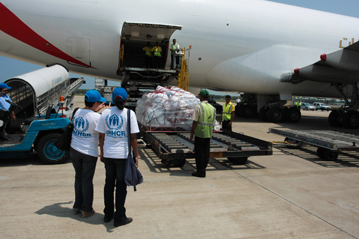Impoverished southern Iraq wrestles with significant refugee returns
Impoverished southern Iraq wrestles with significant refugee returns

BASRA, Iraq, March 9 (UNHCR) - A UN assessment team just back from southern Iraq has warned that an unregulated flow of returnees is straining already limited resources in communities impoverished by decades of conflict and sanctions.
Led by UNHCR's chief of mission in Iraq Yacoub El Hillo - in his role as the UN's alternate designated official for security - and comprising officials from three other UN agencies, the team crossed from Kuwait into the southern Iraqi city of Basra on Sunday. They had been tasked by the UN Secretary-General's Acting Special Representative, Ross Mountain, to assess the security situation and overall conditions on the ground, and to meet with colleagues and partner agencies.
This is the second time an expatriate mission has been sent to the south since the withdrawal of most international staff following last August's bombing of the UN headquarters in Baghdad.
The visiting team reported that Basra seems busier, partly because many Iraqis have returned to the south in recent months. UNHCR cannot verify the number of returnees in Basra aside from the over 9,000 Iraqi refugees it has helped home from Saudi Arabia's Rafha camp and western Iran's camps since last July.
According to the Iraqi Ministry of Trade, more than 122,000 refugees have returned to the nine southern governorates since last year. The Iranian authorities have also reported that more than 70,000 Iraqis previously settled among the local population in Iran have left for home on their own.
"The returning refugees are going back to communities impoverished by decades of conflict and sanctions," cautioned UNHCR spokesman Ron Redmond in a press briefing in Geneva Tuesday. He added that Sunday's assessment team "highlighted increased fears that if the flow of people is not regulated, economic hardship and social unrest will increase."
The visiting UN team was told of the presence of more than 60,000 malnourished children in four southern governorates. Also worrying is the housing situation, which is under enormous strain with the sudden return of long-time exiles and refugees born abroad. Some of them lack shelter or family members who can host them, while others are living with relatives, exacerbating an already crowded situation.
"Because of the lack of investment in recent years and the sudden return of people to the region, there are immediate shelter needs. Together with partners, we are looking at providing housing for the most needy," said Redmond.
UNHCR is planning to construct 1,000 houses and rehabilitate another 1,500 in the south this year for the most vulnerable populations, especially female-headed households. The agency will also continue its community-based activities in returnee-affected communities to ensure access to basic services like water, sanitation, education and primary health rehabilitation.
While UNHCR does not encourage anyone to go back to Iraq because of the prevailing insecurity, it is facilitating the repatriation of those people who actively seek to go back regardless of conditions in the country and the continued absence of international UNHCR staff to monitor their welfare upon their return.
Since last July, 18 convoys of Iraqis have returned from Saudi Arabia's Rafha camp, with the latest arriving in Basra on Sunday. To help them settle back at home, UNHCR gives all returnees repatriation grants, as well as plastic tarpaulins and other relief items and tents for those in need.
The weekend's departure leaves just 483 Iraqi refugees at Rafha camp, down from a peak of 33,000 in the immediate aftermath of the 1991 Gulf War. Some have been resettled over the years, while others have opted for repatriation to Iraq.









